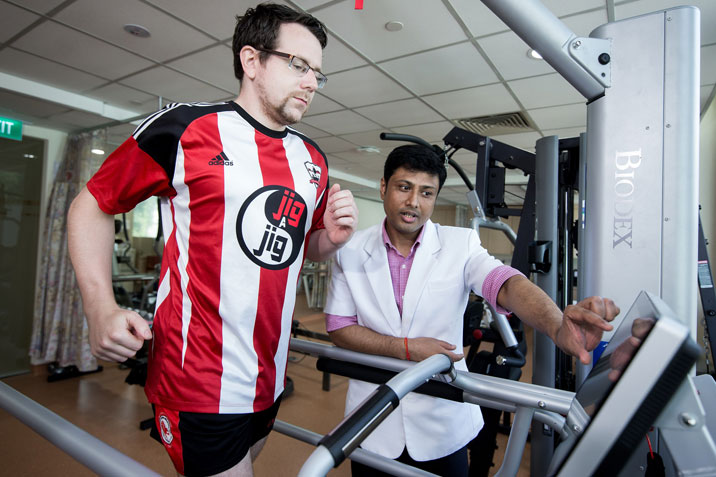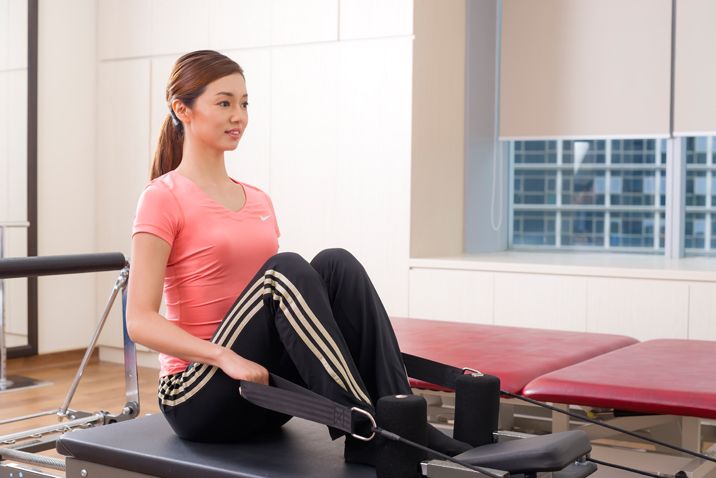Physiotherapy
What is physiotherapy?
Physiotherapy helps to restore normal movement and function to people who have been affected by injuries or conditions.
Physiotherapy uses an evidence-based approach, which begins with a biomechanical assessment of your body followed by a combination of manual and exercise therapy.
Types of physiotherapy services
We specialise in the following areas of physiotherapy:
Back and neck (spine) rehabilitation
Spine rehabilitation promotes recovery and decreases the chances of acute pain becoming chronic in conditions such as:
- Disc prolapse (slipped disc)
- Spondylosis, which is the wear and tear of spinal disks in your neck
- Spondylolisthesis, when one of the lower vertebrae slips out of place onto the bone directly beneath it, causing you lower back pain
We use treatment techniques including:
- Core strengthening
- Ergonomic advice
- Manual therapy
- Manipulation therapy
- Postural correction
- Soft tissue release
- Traction and other electrotherapeutic modalities
Sports physiotherapy
This specialty helps individuals of all ages suffering from sports injury to regain pre-injury levels in their physical fitness. We also help individuals who want to enhance their performance in their preferred sports or prevent injuries.
The types of sports injuries that we help patients recover from include:
- Achilles tendonitis
- Ankle sprain
- Anterior cruciate ligament (ACL) tear
- Golfer’s elbow
- Hamstring strain
- Joint dislocation
- Meniscus injury
- Patellar tendonitis
- Plantar fasciitis
- Rotator cuff injury
- Tennis elbow
Gait analysis for runners
Our physiotherapists use a video-assisted digital gait analysis system to effectively identify underlying biomechanical abnormalities in your gait cycle when you walk and run. This allows us to help runners optimise their efficiency and economy.
Post-operation rehabilitation
After a surgery, you may need therapy to help your body regain its pre-surgery strength and functions. Our physiotherapists can support you in your recovery after the following surgeries.
- Achilles tendon repair
- Anterior cruciate ligament (ACL) reconstruction
- Arthroscopic hip surgery (labral repairs)
- Arthroscopic knee surgery (meniscectomy and meniscal repairs)
- Neck and back surgery (fusion, laminectomy, decompression)
- Nerve release (cubital tunnel, radial tunnel, carpal tunnel, tarsal tunnel)
- Rotator cuff repair
- Surgical fixation of fractures of the arms and legs
- Total joint replacement (shoulder, hip, knee)
Cardiopulmonary physiotherapy
Our physiotherapists provide pre- and post-operative rehabilitation for patients who have undergone heart and lung-related surgical procedures such as:
- Angioplasty
- Cardiothoracic surgery
- Coronary artery bypass
- Heart valve replacement
- Lung resection
- Various abdominal surgeries
Cardiopulmonary rehabilitation is suitable if you have heart and lung conditions such as:
- Cardiac arrest (myocardial ischaemia).
- Chronic obstructive pulmonary disease (COPD)
- Cystic fibrosis
- Pulmonary fibrosis
- Pneumonia
The primary goal is to help you clear lung secretion, improve endurance and regain functional independence. This is done through personalised exercise programmes which include:
- Breathing techniques
- Chest expansion exercises
- Chest physiotherapy
- Energy conservation techniques
- Postural drainage
Our physiotherapists can also support you in using assistive devices such as:
- Acapella
- Cough assist device
- Flutter
- High frequency chest wall oscillation (HFCWO)
- Incentive spirometer
- Inspiratory muscle trainer
- Positive inspiratory pressure (PIP)
Neuro-rehabilitation
Neuro-rehabilitation regimens can help patients build and regain muscle movement and function after a stroke or for neurological conditions such as:
- Balance dysfunction
- Bell’s palsy
- Head injury
- Multiple sclerosis
- Parkinson’s disease
- Spinal cord injury
Stroke rehabilitation
Our physiotherapists help stroke patients relearn motor skills that have been affected due to brain lesions. We use a multidisciplinary approach to promote recovery. This includes:
- Exercises to improve your muscle strength and coordination.
- Mobility or gait training, which involves learning to move with assistive aids, such as a walker or quad stick, or an orthosis (dynamic AFO) to stabilise and assist the ankle. Early standing is facilitated by the tilt table, automatic standing frame, and the bio feedback-balance monitor system.
- A body-weight harness support treadmill to help improve your walking ability and relearn motor skills.
- Functional electrical stimulation to stimulate weakened or partially paralysed muscles to facilitate muscle contraction and muscle re-education.
- Caregiver training and home therapy that will help with a smooth transition from hospital to home. Our therapists will train caregivers on how to transfer or walk the patient safely with the use walking aids.
Vestibular rehabilitation
In this specialty, our physiotherapists aim to alleviate symptoms of vestibular disorders. Seniors commonly experience dizziness and loss of balance, which may be linked to inner ear disorders.
We have an exercise-based programme to help patients improve their balance and prevent falls. Techniques like the canalith repositioning treatment, otherwise known as the Epley manoeuvre, are effective in patients suffering from benign paroxysmal positional vertigo.
Physiotherapy for health and well-being
We also offer the following physiotherapy services to promote your health and well-being:
Postnatal rehabilitation
Postnatal rehabilitation is for new mothers, with special emphasis given to pelvic floor exercises. Our physiotherapist will guide you through exercises for post-delivery recovery and to reduce the risk of health complications such as stress incontinence, and pelvic girdle and lower-back pain.
We will advise you how to set up your baby's crib ergonomically, how to care for your back and the correct carrying techniques when taking care of your newborn baby.
Clinical pilates
Clinical pilates focuses on posture, core stability, balance, control, strength, flexibility, and breathing. It can restore natural spinal curvature and help re-establish muscular control around the joints.
Its benefits include the
- Improvement of core muscle activation
- Better control of joint movements
- Greater peripheral mobility
Onco-rehabilitation
Onco-rehabilitation is designed to restore strength, physical function, and independence that patients may have lost due to cancer or cancer treatment. The physiotherapist will assist and design an exercise regime that can help patients to function at a minimum level of dependency and optimise their quality of life.
Physiotherapy for diabetes
Physiotherapy can help in the management of type 2 diabetes and its complications. A physiotherapist can prescribe a customised exercise plan, which includes aerobic exercise and strength training, to help patients improve their physical well-being. They can also provide education on proper foot care and other areas of concern for people with diabetes.
Physiotherapy for persons with disabilities
Physiotherapy can help people with physical disabilities manage their conditions, regain certain functions or learn improved ways of performing their daily activities.
A physiotherapist can help with disabilities such as cerebral palsy, muscular dystrophy and chronic pain. After assessing each patient's ability, the physiotherapist will develop a customised plan to meet their needs and goals.
Physiotherapy for older adults
Bone loss is a part of the aging process, but it can lead to osteoporosis and the increased risk of bone fractures. This risk is greater among women in menopause, although it can affect anyone.
A physiotherapist can assess your needs and develop a tailored programme for you to help improve your overall bone health and slow down bone loss. They can recommend:
- Suitable exercises to strengthen your bones and muscles
- Proper posture and alignment
- Ways to improve your balance and reduce the risk of falls
Craniosacral therapy
Craniosacral therapy on the central nervous and fascial system helps manage both acute and chronic pain. It can also help promote overall health, improve well-being and manage stress.
Why do you need physiotherapy?
Physiotherapy can help you to:
- Enhance your recovery after a surgical procedure
- Enhance your performance in sports
- Manage any acute pain and ensure that it does not become chronic
- Prevent injury
- Regain your pre-injury or pre-surgery movements and functions
- Restore your independence









